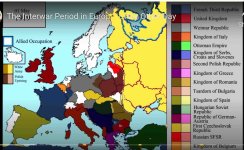raharris1973
Well-known member
What if all the lands under the control of the Army of the Provisional Government of Russia as of May Day, 1917, thus excluding the Central Powers occupied lands of Russian Poland, Lithuania, and Courland, but included the northern Baltics, Finland, Bessarabia, the Moldavian portion of Romania, and multiple northeastern, heavily Armenian provinces of the Ottoman Empire, were ISOT forward in time, reappearing as they were on that date to an unsuspecting world that believes the current date is May 1, 1919?
The Premier of this Provisional Government, led by Duma politicians, is Prince Georgi Lvov, a lesser known name than the infamous Alexander Kerensky, who actually was premier for a shorter period of the PG's existence. But real power is exercised in Russia's cities and villages by the Soviets or Councils, which in Petrograd, and most are places, are dominated by multiple Socialist parties, but not necessarily the Bolshevik Party at this time.
Instantly, on their day of celebration, global believers in the Bolshevik/Communist strain of Socialist thought see their dreamt of worker's state undone, replaced by a Provisional Government and Soviets dual power situation, struggling its way to a constitution. Outside the lines of the 1917 PG regime's military control, it is the May 1919 world, and Europe is remaking its postwar borders in the months after the Nov 1918 armistice with several "successor states" from the Austro-Hungarian and Russian empires taking shape. Most importantly, for Russia, are states of Poland, and Lithuania forming, and there is a small, intrepid patch of land controlled by Bolshevik Communists and Red Army troops in a territory covering Courland in Latvia and northeastern Lithuania. See map:
How does the world of 1919, and the peacemaking powers at Versailles, deal with the sudden reappearance of pre-Bolshevik, Provisional Government Russia?
How do the Provisional Government, and Soviets deal with their challenges, and their good fortune, of their Central Powers opponents being instantly defeated with no further effort required? And what about the special challenges of settling precise borders with Poland and even Lithuania, or dealing with the "could have been future" knowledge of what the Bolsheviks did, and then other factions did in the subsequent civil war? And as for the Red remnant in the Baltics, does it have the mass and proficiency, and bold, decisive leadership, to bid to try to take over Petrograd and Russia from a Provisional Government that hasn't seen a faction as ruthless as this in action yet firsthand? Or does that pocket of Reds defect and disintegrate?
Assuming the Bolshevik remnant is squashed rather than metastasizing, and Russia takes a noncommunist path, what does the future hold for Russia's peacetime consituent assembly, governance, national issues, and politics, and how is that reflected in the wider world. What is the impact of a world where a Bolshevik revolution happened, but disappeared like a mirage?
The Premier of this Provisional Government, led by Duma politicians, is Prince Georgi Lvov, a lesser known name than the infamous Alexander Kerensky, who actually was premier for a shorter period of the PG's existence. But real power is exercised in Russia's cities and villages by the Soviets or Councils, which in Petrograd, and most are places, are dominated by multiple Socialist parties, but not necessarily the Bolshevik Party at this time.
Instantly, on their day of celebration, global believers in the Bolshevik/Communist strain of Socialist thought see their dreamt of worker's state undone, replaced by a Provisional Government and Soviets dual power situation, struggling its way to a constitution. Outside the lines of the 1917 PG regime's military control, it is the May 1919 world, and Europe is remaking its postwar borders in the months after the Nov 1918 armistice with several "successor states" from the Austro-Hungarian and Russian empires taking shape. Most importantly, for Russia, are states of Poland, and Lithuania forming, and there is a small, intrepid patch of land controlled by Bolshevik Communists and Red Army troops in a territory covering Courland in Latvia and northeastern Lithuania. See map:

How does the world of 1919, and the peacemaking powers at Versailles, deal with the sudden reappearance of pre-Bolshevik, Provisional Government Russia?
How do the Provisional Government, and Soviets deal with their challenges, and their good fortune, of their Central Powers opponents being instantly defeated with no further effort required? And what about the special challenges of settling precise borders with Poland and even Lithuania, or dealing with the "could have been future" knowledge of what the Bolsheviks did, and then other factions did in the subsequent civil war? And as for the Red remnant in the Baltics, does it have the mass and proficiency, and bold, decisive leadership, to bid to try to take over Petrograd and Russia from a Provisional Government that hasn't seen a faction as ruthless as this in action yet firsthand? Or does that pocket of Reds defect and disintegrate?
Assuming the Bolshevik remnant is squashed rather than metastasizing, and Russia takes a noncommunist path, what does the future hold for Russia's peacetime consituent assembly, governance, national issues, and politics, and how is that reflected in the wider world. What is the impact of a world where a Bolshevik revolution happened, but disappeared like a mirage?

